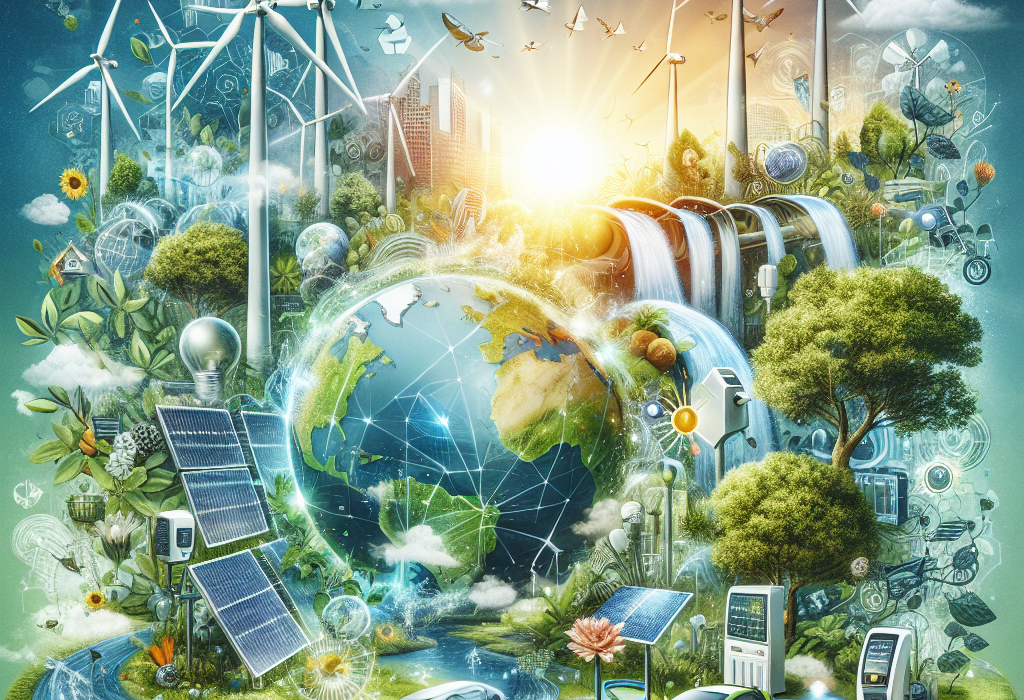Green Tech Innovations: Sustainable Solutions for Global Challenges
As the world confronts pressing environmental challenges, from climate change to resource scarcity, the drive towards sustainable solutions has never been more urgent. Enter Green Technology, or Green Tech — a burgeoning field that seeks to mitigate human impact on the environment through innovation, efficiency, and renewable practices. From renewable energy advancements to novel waste management systems, Green Tech is spearheading a much-needed revolution towards sustainability.
Renewable Energy: At the Heart of Green Tech
One of the most dynamic areas of Green Tech is in renewable energy. Traditional fossil fuels have proven to be unsustainable, contributing significantly to greenhouse gas emissions and environmental degradation. Renewable sources such as solar, wind, hydro, and geothermal energy offer cleaner alternatives.
Solar Power Innovations
Solar panels have come a long way since their inception. Today, photovoltaic cells are more efficient and affordable than ever, thanks to advances in materials science and manufacturing techniques. Moreover, breakthroughs in perovskite solar cells promise even higher efficiencies and lower costs, potentially revolutionizing the market. Coupled with battery storage solutions, solar energy offers a reliable and sustainable option for both urban and rural applications.
Wind Energy Advances
Wind energy, another cornerstone of renewable energy, is seeing rapid innovation. Modern wind turbines are taller, with longer blades, allowing them to capture more energy from the wind. Offshore wind farms, which can take advantage of stronger and more consistent winds, are also expanding globally. These advances are reducing the cost per kilowatt-hour, making wind energy increasingly competitive with fossil fuels.
Sustainable Agriculture: Feeding the World Responsibly
Agriculture is both a significant contributor to environmental problems and a sector ripe for innovative solutions. Sustainable farming practices, enabled by Green Tech, can help ensure that the global food supply is secure and eco-friendly.
Precision Agriculture
Precision agriculture leverages satellite imagery, IoT devices, and data analytics to optimize farming practices. By providing farmers with real-time data on soil health, weather conditions, and crop growth, precision agriculture allows for more efficient use of resources like water, fertilizers, and pesticides. This not only boosts crop yields but also minimizes environmental impact.
Vertical Farming and Hydroponics
Vertical farming and hydroponic systems represent a radical shift in how we grow food. These methods allow for year-round, high-density cultivation using significantly less water and land compared to traditional farming. Urban vertical farms can reduce transportation emissions by locatiing food production closer to consumers, offering a fresh and sustainable alternative to conventional supply chains.
Waste Management: Turning Trash into Treasure
Effective waste management is essential for a sustainable future. Innovations in waste processing and recycling technologies are creating new opportunities to reduce, reuse, and recycle more efficiently.
Circular Economy
The concept of a circular economy — where products are designed to be reused and recycled indefinitely — is gaining traction. Companies are increasingly adopting eco-friendly product designs and take-back programs, minimizing waste and maximizing resource use.
Advanced Recycling Techniques
New recycling technologies, such as chemical recycling, are capable of breaking down plastics into their base molecules, which can then be reused to create new products. This not only reduces the demand for virgin materials but also helps to tackle plastic pollution.
Sustainable Transportation: Paving the Way for a Greener Future
The transportation sector is a major contributor to global greenhouse gas emissions. Innovations in electric vehicles (EVs) and public transportation are essential to creating a more sustainable future.
Electric and Hydrogen Vehicles
Electric vehicles, powered by increasingly efficient batteries, offer a clean alternative to traditional gasoline-powered cars. Advances in charging infrastructure and battery technology are making EVs more practical and accessible. Hydrogen fuel cell vehicles, which emit only water vapor, are another promising technology, particularly for long-haul and heavy-duty transportation.
Smart Public Transport
Smart public transport systems, which use data and connectivity to optimize routes, schedules, and energy use, are helping cities reduce their carbon footprints. Electric buses and trains, powered by renewable energy, further enhance the sustainability of urban transport networks.
Conclusion
Green Tech innovations provide a beacon of hope in the fight against environmental degradation and climate change. By harnessing the power of technology and ingenuity, humanity can develop sustainable solutions that address global challenges and ensure a healthier, more resilient planet for future generations. As investment and interest in Green Tech continue to grow, the potential for transformative impact becomes ever more achievable. The journey towards a sustainable future is not just an option — it is an imperative.
















Leave feedback about this
You must be logged in to post a comment.